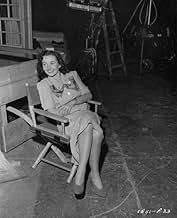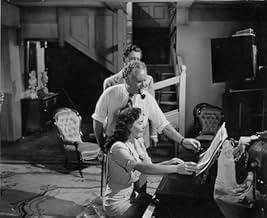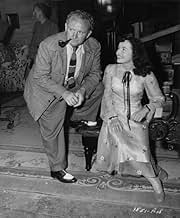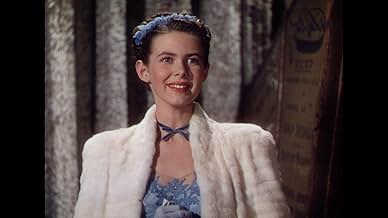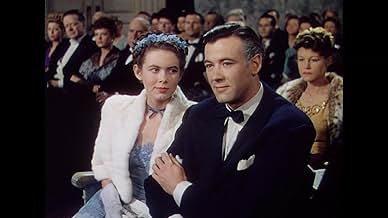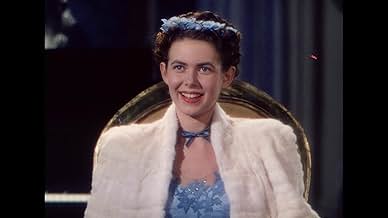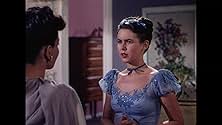NOTE IMDb
6,4/10
396
MA NOTE
Une pianiste promise à une grande carrière, décide de tout abandonner quand elle se rend compte que sa réussite risque de mettre en péril celui de son professeur dont elle est amoureuse. Ell... Tout lireUne pianiste promise à une grande carrière, décide de tout abandonner quand elle se rend compte que sa réussite risque de mettre en péril celui de son professeur dont elle est amoureuse. Elle part et épouse un fermier dont elle aura une fille.Une pianiste promise à une grande carrière, décide de tout abandonner quand elle se rend compte que sa réussite risque de mettre en péril celui de son professeur dont elle est amoureuse. Elle part et épouse un fermier dont elle aura une fille.
- Récompenses
- 2 victoires au total
Bill Carter
- George Sampter
- (as William Carter)
Maria Ouspenskaya
- Madame Goronoff
- (as Mme. Maria Ouspenskaya)
Lillian Bronson
- Music Teacher
- (non crédité)
Edgar Caldwell
- Call Boy
- (non crédité)
Paulina Carter
- 12 Year Old Girl
- (non crédité)
Maurice Cass
- Music Teacher
- (non crédité)
Charles Coleman
- Butler
- (non crédité)
Avis à la une
The Dutch actor Philip Dorn plays a concert maestro, Leopold Goronoff, in this film. He's reputed to be one of the greatest pianists of his age....and he definitely has the ego for this...and then some! An old friend convinces Goronoff to take on a student and Myra (Catherine McLeod) is amazing. Eventually, she has her debut and Goronoff is angry because she is so good...perhaps better than him! What a putz! Despite this, Myra is in love with her mentor....and what chance does her childhood friend, George, have with her?
There are several problems with the film, though on balance the movie isn't bad. There are too many long and intense piano pieces and editing them down a bit or allowing for some lighter classical pieces would have helped the film. Additionally, Dorn's character is simply too awful to care about him and there is no reason for Myra to care about this jerk..none.. It's also very slow and the film doesn't seem to know when to end. On the plus side, McLeod is amazing on the piano, the Technicolor is amazingly good and the basic story is quite sound.
There are several problems with the film, though on balance the movie isn't bad. There are too many long and intense piano pieces and editing them down a bit or allowing for some lighter classical pieces would have helped the film. Additionally, Dorn's character is simply too awful to care about him and there is no reason for Myra to care about this jerk..none.. It's also very slow and the film doesn't seem to know when to end. On the plus side, McLeod is amazing on the piano, the Technicolor is amazingly good and the basic story is quite sound.
It's a very good story, like an interesting experiment in musical psychology, delving into and trying to reach the very essence and nature of the extreme sensitivity of the musical sense, but the acting is a bit stiff, and the story, although tremendously good and interesting, doesn't quite come alive. Catherine McLeod saves the picture, her acting is wholly satisfactory and convincing all the way, but the others are at times a bit too wooden. Philip Dorn is more abominable than not as the utterly rude and indecent conductor who thinks he can go at any length in insulting Catherine in the name of music, and no wonder she abandons music on conditions like that. There are many details in this artificial set-up that just don't work, they are neither credible nor natural, but there is nothing wrong with the idea. Although Frank Borzage made several films of music, and they are all good, it's over-evident that he was no musician himself.
On the whole, forget the flaws in the acting, the direction and the lack of musical realism but please follow and study the idea and the story, because the thoughts behind all this were humanly and psychologivally very interesting indeed.
On the whole, forget the flaws in the acting, the direction and the lack of musical realism but please follow and study the idea and the story, because the thoughts behind all this were humanly and psychologivally very interesting indeed.
This is director/producer Frank Borzage's most lavishly opulent sound film. It's a curio of a time long since past, when romanticism was celebrated and even the most wildly unrealistic moments seemed perfectly natural within their filmic contexts. Myra (the luminous and talented Catherine McLeod) is an aspiring concert pianist who comes to study under the imperious maestro Goronov (Philip Dorn), who was an admirer of her father (Felix Bressart) many years ago when the father was a professional pianist in Europe. But the father has since retired to rural America after meeting Myra's mother and forsaking his career for her 20 years earlier. (The mother has since died, and Myra's "maternal guidance" in the film is provided by the dimunitive powerhouse Maria Ouspenskaya, here playing Goronoff's mother and "the woman behind the great man.") As Myra is molded by Goronoff (who doesn't hold women in any high regard at all and goes through them like he would pairs of underwear, but who does respect talent) into a superior pianist, Myra falls in love with her Svengali. But Goronoff refuses to admit how much Myra has come to mean to him, and when her father dies, the grief-stricken Myra must choose between the man she has loved unrequitedly and a local farmer, George (Bill Carter) who has loved her all her life. Which one will she choose?
This is a classic woman's-film dilemma, and the characters in it are more mythical "types" than the flesh-and-blood, warts-and-all characters we would expect to see today. But that's not a problem for Borzage, whose intensly romantic, lushly envisioned films have always put love on the highest pedestal. What brings this film truly to life is the nuanced, deeply felt performances by all involved. Even the seemingly serene, uncomplicated George comes to life when declaring his hidden love for Myra. No matter how surreal the story may seem (especially if you're not used to seeing and enjoying classic cinema melodramas), the actors' and the director's commitment to it is absolute, giving the film an interior life and intensity that have made it a cult favorite and guilty pleasure, especially for Borzage fans. The classic Borzage theme: that metaphysical love can (and should) conquer all is ever present, as are the typical Borzagian dichotomies (e.g., between artist and simple country folk, passionate love and companionate love, men and women, and country versus city, etc.)
Borzage had just signed a multipicture deal with the fledgling Republic studios in 1945 when production began, and it's clear the studio spared no expense with their Academy-Award winning director. Lavishly photographed in Technicolor with colossal classical sets, exquisite costumes, and extensive piano doubling by Artur Rubinstein, I'VE ALWAYS LOVED YOU will definitely appeal to classical music lovers familiar with the backbiting world of professional music. All others need to watch not only with an open mind, but with an open heart.
Despite the somewhat contrived ending, I'VE ALWAYS LOVED YOU is worth seeing as one of Borzage's peniultimate films, and one he was able to make his most lushly romantic. To this day, few directors can boast such an incredible command of both the visual and emotional elements of almost every film (with the possible exception of Douglas Sirk). As Rainer Fassbinder once said of Douglas Sirk, you can tell from his films that he (Sirk) "really loves people, and doesn't depise them, as we do." The same could be said of Borzage--one of the cinema's first, last, and greatest romantics.
Kudos also go to the UCLA Archives for a superb Technicolor restoration. This VHS is definitely the version to watch. Beware of old black and white TV prints..
This is a classic woman's-film dilemma, and the characters in it are more mythical "types" than the flesh-and-blood, warts-and-all characters we would expect to see today. But that's not a problem for Borzage, whose intensly romantic, lushly envisioned films have always put love on the highest pedestal. What brings this film truly to life is the nuanced, deeply felt performances by all involved. Even the seemingly serene, uncomplicated George comes to life when declaring his hidden love for Myra. No matter how surreal the story may seem (especially if you're not used to seeing and enjoying classic cinema melodramas), the actors' and the director's commitment to it is absolute, giving the film an interior life and intensity that have made it a cult favorite and guilty pleasure, especially for Borzage fans. The classic Borzage theme: that metaphysical love can (and should) conquer all is ever present, as are the typical Borzagian dichotomies (e.g., between artist and simple country folk, passionate love and companionate love, men and women, and country versus city, etc.)
Borzage had just signed a multipicture deal with the fledgling Republic studios in 1945 when production began, and it's clear the studio spared no expense with their Academy-Award winning director. Lavishly photographed in Technicolor with colossal classical sets, exquisite costumes, and extensive piano doubling by Artur Rubinstein, I'VE ALWAYS LOVED YOU will definitely appeal to classical music lovers familiar with the backbiting world of professional music. All others need to watch not only with an open mind, but with an open heart.
Despite the somewhat contrived ending, I'VE ALWAYS LOVED YOU is worth seeing as one of Borzage's peniultimate films, and one he was able to make his most lushly romantic. To this day, few directors can boast such an incredible command of both the visual and emotional elements of almost every film (with the possible exception of Douglas Sirk). As Rainer Fassbinder once said of Douglas Sirk, you can tell from his films that he (Sirk) "really loves people, and doesn't depise them, as we do." The same could be said of Borzage--one of the cinema's first, last, and greatest romantics.
Kudos also go to the UCLA Archives for a superb Technicolor restoration. This VHS is definitely the version to watch. Beware of old black and white TV prints..
...and I always will...
Some say his post WW2 works were inferior to the thirties major works .Perhaps so.But it is no reason to dismiss them.
"I've always loved you" is unique,it defines music as a way of communicating emotions.Leopold and Myra use Rachmaninoff (mainly "Second" ),Beethoven ,Lizt and other musicians to express their admiration,their tenderness,their love,their jealousy,their pride,their lust for life,their hate,their contempt ,you name it.In the central scene ,where Myra plays the piano with Leopold's full symphonic orchestra is a real desperate fight ,probably the best concert scene ever filmed (with the eventual exception of Hitchcock's "the man who knew too much" (1956))And that scene is followed by another one where the two musicians ,although miles apart ,continue their "conversation" in a strange telepathy.
The audience who knows Borzage's earlier works (such as "three comrades" "little man what now?" "mortal storm" "cargo" ...) might be disoriented while watching the beginning of the movie .But the master's touch is still here.
Two elements are Borzagesque:the first is George's character.He is akin to Hans ("little man" ) and to the "three comrades" .He is the man who believes in true love ,the simple man who is like a bull in a china shop when he attends the first concert but whose heart is always in the right place.
And the other one is Mme Maria Ouspenskaya (she is granted a "Mme" during the cast and credits!) who was the unforgettable mother of Martin (James Stewart) in Borzage's memorable "mortal storm" .Here she portrays Leopold's mother with authority.Her death is a great moment of delicacy when the music stops in her hand.
Probably not as appealing as Borzage's earlier works,this film is yet waiting to be rediscovered.
Some say his post WW2 works were inferior to the thirties major works .Perhaps so.But it is no reason to dismiss them.
"I've always loved you" is unique,it defines music as a way of communicating emotions.Leopold and Myra use Rachmaninoff (mainly "Second" ),Beethoven ,Lizt and other musicians to express their admiration,their tenderness,their love,their jealousy,their pride,their lust for life,their hate,their contempt ,you name it.In the central scene ,where Myra plays the piano with Leopold's full symphonic orchestra is a real desperate fight ,probably the best concert scene ever filmed (with the eventual exception of Hitchcock's "the man who knew too much" (1956))And that scene is followed by another one where the two musicians ,although miles apart ,continue their "conversation" in a strange telepathy.
The audience who knows Borzage's earlier works (such as "three comrades" "little man what now?" "mortal storm" "cargo" ...) might be disoriented while watching the beginning of the movie .But the master's touch is still here.
Two elements are Borzagesque:the first is George's character.He is akin to Hans ("little man" ) and to the "three comrades" .He is the man who believes in true love ,the simple man who is like a bull in a china shop when he attends the first concert but whose heart is always in the right place.
And the other one is Mme Maria Ouspenskaya (she is granted a "Mme" during the cast and credits!) who was the unforgettable mother of Martin (James Stewart) in Borzage's memorable "mortal storm" .Here she portrays Leopold's mother with authority.Her death is a great moment of delicacy when the music stops in her hand.
Probably not as appealing as Borzage's earlier works,this film is yet waiting to be rediscovered.
Catherine McLeod gives a terrific star performance as the luscious center of this ambitious romance film from Frank Borzage.
McLeod plays a young pianist of promise who comes under the wing of a famous and slightly crazed pianist (Philip Dorn) whose demands are limitless. She leaves behind her father's farm and the man (William Carter) who loves her selflessly. Will she marry the mad musician or the simple farmer? More than a standard "woman's picture" or romance, this film features role reversals among the male characters with the lusty, aggressive pianist battling the effete and quiet farmer for the girl's affections. There's also this weird synergy between the girl and the pianist because they share the same passion for music while she seems to have nothing at all in common with the farmer .... except love.
McLeod gives a star-making performance and looks great, but her career never quite took off. Dorn and Carter are perfect as the men orbiting her. Co-stars include Maria Ouspenskaya, Fritz Feld, Felix Bressart, Elizabeth Patterson, Lewis Howard, Vanessa Brown, and Cora Witherspoon. And yes that's the young Andre Previn as the student Dorn dismisses.
Maybe not a masterpiece, but this film from Republic, filled with great music and filmed in lush Technicolor, shouldn't be among the forgotten.
McLeod plays a young pianist of promise who comes under the wing of a famous and slightly crazed pianist (Philip Dorn) whose demands are limitless. She leaves behind her father's farm and the man (William Carter) who loves her selflessly. Will she marry the mad musician or the simple farmer? More than a standard "woman's picture" or romance, this film features role reversals among the male characters with the lusty, aggressive pianist battling the effete and quiet farmer for the girl's affections. There's also this weird synergy between the girl and the pianist because they share the same passion for music while she seems to have nothing at all in common with the farmer .... except love.
McLeod gives a star-making performance and looks great, but her career never quite took off. Dorn and Carter are perfect as the men orbiting her. Co-stars include Maria Ouspenskaya, Fritz Feld, Felix Bressart, Elizabeth Patterson, Lewis Howard, Vanessa Brown, and Cora Witherspoon. And yes that's the young Andre Previn as the student Dorn dismisses.
Maybe not a masterpiece, but this film from Republic, filled with great music and filmed in lush Technicolor, shouldn't be among the forgotten.
Le saviez-vous
- AnecdotesThis was Republic's first feature in Technicolor.
- Crédits fousThe Republic Pictures logo does not appear on this film.
- ConnexionsSpoofed in It's a Grand Old Nag (1947)
Meilleurs choix
Connectez-vous pour évaluer et suivre la liste de favoris afin de recevoir des recommandations personnalisées
Détails
- Durée1 heure 57 minutes
- Couleur
- Rapport de forme
- 1.37 : 1
Contribuer à cette page
Suggérer une modification ou ajouter du contenu manquant

Lacune principale
By what name was Je vous ai toujours aimé (1946) officially released in India in English?
Répondre
